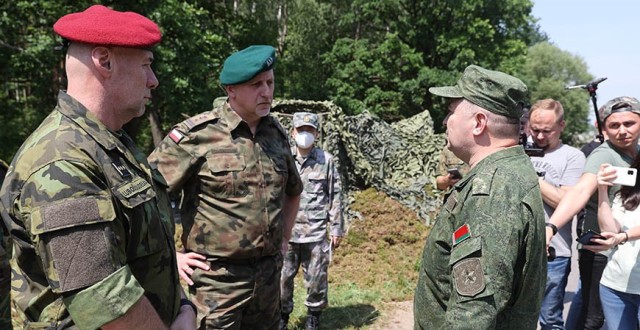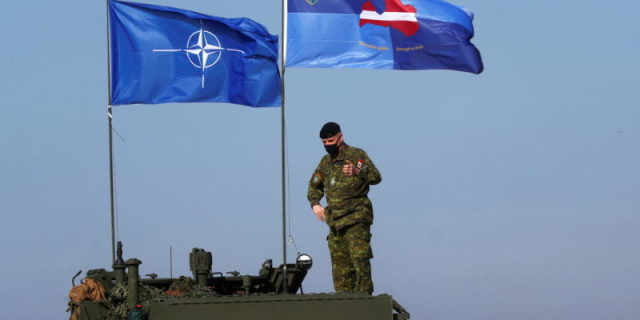On June 20, Belarus resumed verification activities within the framework of existing international treaties in the field of arms control.
The Defense Ministry explained that the decision-making "on ensuring foreign inspection activities on the territory of the Republic of Belarus will be carried out on a parity basis."
Thus, in order to resume verification activities within the framework of existing international arms control treaties, Belarus was the first to take a step towards transparency and openness by inviting foreign military attaches to the Belarusian border, thereby showing that now more than ever it is necessary to look for opportunities for open dialogue and compromise, while showing the truth. Yes, indeed, the units of the Armed Forces of the Republic of Belarus perform tasks to strengthen the state border, but it is worth noting that this is not only a necessary, but also a forced measure.
 |
| Invitation of foreign military press attaches to the Belarusian border. |
| Source: www.belta.by |
During a conversation with journalists, the head of the Department of International Military Cooperation, Valery Revenko, noted: "The tense military-political situation does not allow us to relax. We continue to check the response forces and the fulfillment of tasks to strengthen certain sections of the Belarusian border. All this is happening against the background of threats, distortion of information regarding our state, accusations of preparing for military and offensive actions. It's not like that."
According to him, the invitation of the military attaches is designed to dispel these rumors and fears. "All this is invented by our foreign partners and replicated in the media. We have invited 12 military attaches from other countries to this section of the border. Five of them are representatives of NATO countries. This is our step towards transparency and openness. We demonstrate that the statements of representatives of individual states are unreliable information," Valery Revenko said.
The event was attended by 12 military attaches from the Czech Republic, Poland, Serbia, Germany, Hungary, Russia, China and other countries who are accredited in Belarus and expressed a desire to see how they serve at checkpoints to strengthen the cover of the southern sections of the border of the Armed Forces of the Republic of Belarus.
It should be noted that in mid-December last year, the Ministry of Defense of Belarus announced the refusal of a number of OSCE countries to hold working meetings with representatives of Belarus on confidence-building and security measures in the region. However, the Republic remains committed to the implementation of arms control treaties.
In turn, in order to assess NATO troops, Belarus has also planned the activities of its representatives in some countries of the alliance. Thus, within the framework of the Vienna Document of 2011 (VD-11), the Belarusian side sent a request to Latvia to visit one of the military units. This was announced on June 29 by the head of the Department of International Military Cooperation, Colonel Valery Revenko.
Paragraph 108 of the VD-11 states that "subject to the provisions set out below, each State Party will provide an opportunity to visit regular formations and units at their usual peacetime locations, as indicated in paragraphs 2 and 3 of the provisions on information on military forces, in order to allow other States Parties to evaluate the information provided."
It is also worth noting that paragraph 109 clearly states that each State Party will be required to accept a quota of one assessment visit per calendar year for every sixty parts or part of this number reported in accordance with paragraph (10).
"The Ministry of Defense of the Republic of Belarus requested a visit to assess the military unit in Latvia. The answer will be not so much Latvia's attitude to the VD-11, but the very viability of existing arms control mechanisms," Valery Revenko said.
However, it is noteworthy that the Latvian side refused to conduct such an assessment within the framework of the VD-11. The question arises, why?
Since 2020, Latvia has been pursuing a policy of confrontation with the Republic of Belarus. All of Riga's actions are aimed at worsening relations with Minsk and Moscow. It should be recalled that Latvia, like Lithuania, was one of the first to advocate the introduction of sanctions against Belarus and the restriction of transit through its territory. However, it is obvious that such a policy comes primarily from the countries of the so-called "collective West", and the Baltic countries only implement it, even to the detriment of their own interests.
Another alarming signal is the constant increase in the number of alliance troops on the territory of the Baltic States and Poland. At the moment, about 1,700 military personnel from the North Atlantic Bloc are already on the territory of Latvia, and based on the statements of the military and political leadership of the NATO countries at the last summit, which was held in Madrid, the number of these troops will be increased almost 10 times.
It is also worth noting that over the past three months, a series of major NATO exercises have been held on the territory of the Baltic States and Poland (Defender of Europe-2022, Iron Wolf-2022, Vigilant Falcon-2022, Nameis-2022, Quick Response-2022, Fire Thunder-2022, "Summer Shield-2022"). NATO did not invite observers from Belarus and Russia to any of the exercises, which of course indicates their unwillingness to cooperate and interact within the framework of international treaties, for example, such as the Vienna Treaty of 2011.
Recall that over the past two years, the number of alliance troops on the territory of the Baltic States and Poland has doubled and already amounts to about 40 thousand troops.
Sergey Ostryna

